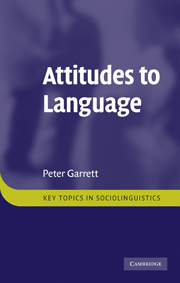Book contents
- Frontmatter
- Contents
- List of figures
- List of tables
- Acknowledgements
- 1 Introduction
- 2 Fundamentals of language attitudes
- 3 Main approaches to the study of language attitudes
- 4 Matched and verbal guise studies: focus on English
- 5 Matched and verbal guise research in more contexts
- 6 Attitudes to speech styles and other variables: communication features, speakers, hearers and contexts
- 7 Communication accommodation theory
- 8 Language attitudes in professional contexts
- 9 Societal treatment studies
- 10 Direct approach
- 11 Folklinguistics
- 12 An integrated programme of language attitudes research
- 13 Conclusion
- Glossary
- References
- Index
- References
1 - Introduction
Published online by Cambridge University Press: 05 June 2012
- Frontmatter
- Contents
- List of figures
- List of tables
- Acknowledgements
- 1 Introduction
- 2 Fundamentals of language attitudes
- 3 Main approaches to the study of language attitudes
- 4 Matched and verbal guise studies: focus on English
- 5 Matched and verbal guise research in more contexts
- 6 Attitudes to speech styles and other variables: communication features, speakers, hearers and contexts
- 7 Communication accommodation theory
- 8 Language attitudes in professional contexts
- 9 Societal treatment studies
- 10 Direct approach
- 11 Folklinguistics
- 12 An integrated programme of language attitudes research
- 13 Conclusion
- Glossary
- References
- Index
- References
Summary
In October 2007, the Sunday Telegraph carried a report that Scottish actor Sean Connery had accused the British Prime Minister Gordon Brown of attempting to modify his Scottish accent in order to appeal to voters in England (Mandrake 2007). Connery was reported as saying that Brown's accent ‘certainly isn't as pronounced as it was, but Gordon has to ride two horses down in Westminster. He knows it's difficult to appeal to people on both sides of the border, but he has to try, even if it means disappointing them both a bit.’ Brown, the journalist suggested, was seeking to ‘disguise his native tongue’.
Connery himself deployed his own Scottish variety of English when he played Richard the Lionheart in the film Robin Hood: Prince of Thieves. This portrayal of an English monarch with a Scottish accent was much commented on (as was US actor Kevin Costner's non-British accent in his role as Robin Hood in the same film). Audiences have expectations, it seems. These are clearly not based on any reality of how these characters might have spoken. Modern audiences would undoubtedly struggle with the English spoken at the time in which the tales of Robin Hood are set, for example, and Richard the Lionheart himself, though born in Oxford, was a French-speaking Plantagenet, who, according to Harvey (1977), may have spoken little English at all. But these expectations are doubtless based on a stereotypical notion in some that such famous figures in English history ought to sound, to modern ears, English.
- Type
- Chapter
- Information
- Attitudes to Language , pp. 1 - 18Publisher: Cambridge University PressPrint publication year: 2010

